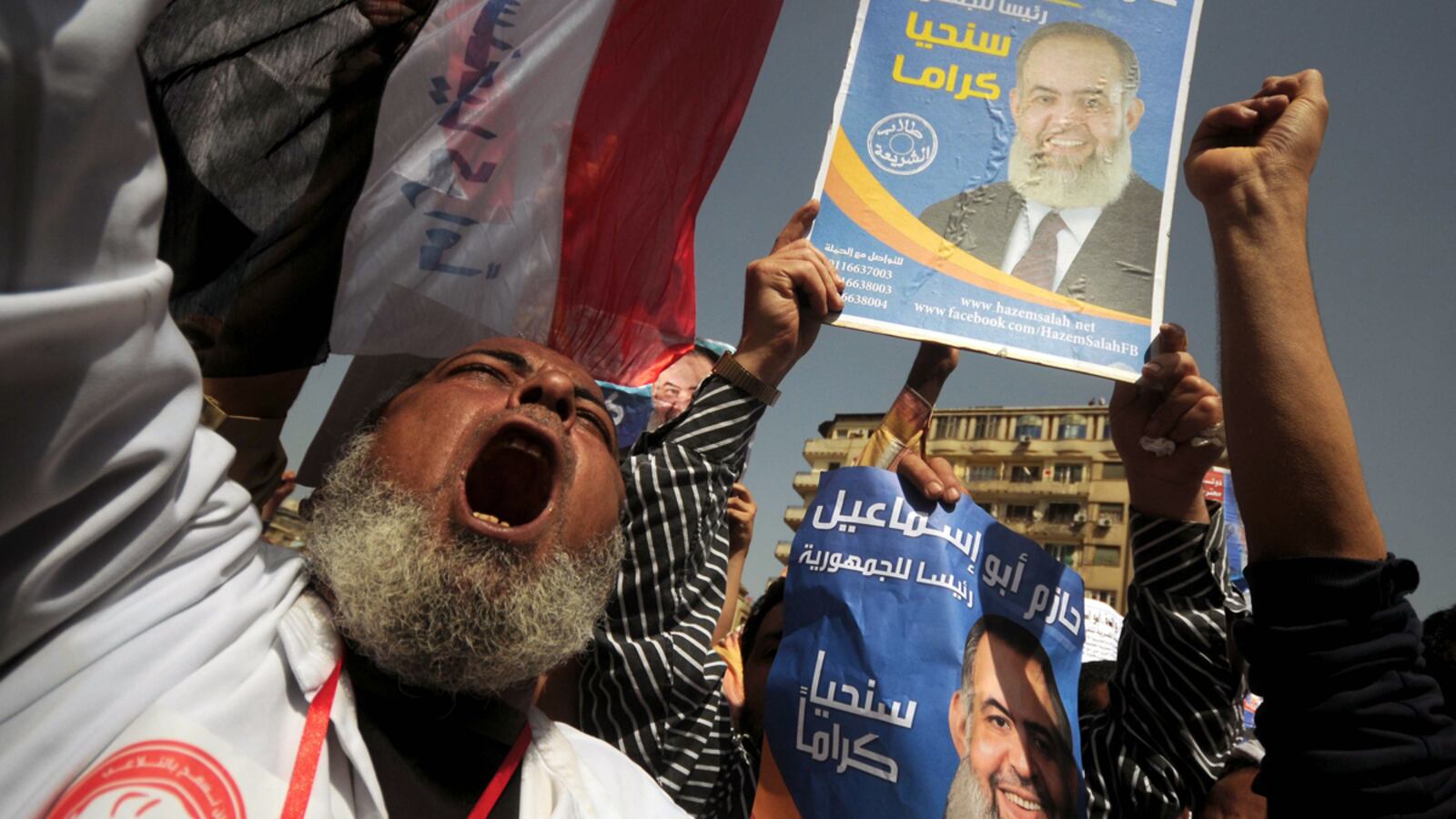As Mohammed’s taxi darted in and out of Cairo’s grinding riverside traffic, scores of fundamentalist Salafi Muslims weaved through the honking cars and chanted like triumphant soccer fans.
One group, crammed into the back of a pickup truck, waved placards featuring the face of Abu Ismail, the embattled presidential contender facing disqualification from next month’s poll.
The ultraconservative Salafi preacher, who has seared his campaign with lashings of anti-American rhetoric, has been poleaxed by recent claims that his late mother was a U.S. citizen.
The allegation is decidedly inconvenient, given that according to Egypt’s election law, candidates cannot register if they have foreign parents.
But after a week spent staving off a flurry of negative headlines, the radical preacher was thrown a lifeline earlier this week when a court ruled that Egypt’s authorities must provide proof of his mother’s nationality—effectively tossing the ball back into the election commission’s hands.
His supporters immediately took the streets of downtown Cairo in celebration, letting off fireworks and chanting their support for the preacher.
Mohammed, his taxi brought to a standstill by Ismail’s jubilant supporters, picked up a poster of the preacher from his dashboard and waved it through the passenger window.
“I don’t want him to win,” he explained, “I just use it so I can get though the crowd.” In the world according to Mohammed, not to mention many other voters of non-Islamic stripes, the Salafis are a foreign-funded menace intent on curtailing personal freedoms. “They are all on the streets because they are being paid by Saudi Arabia,” he added with a grin.

Yet riding on the back of widespread support across Egypt, the ultraconservative Salafis are now a force to be reckoned with.
Their most salient champions, the Al-Nour Party, won a quarter of the vote in the recent parliamentary elections, while a recent survey from the Al-Ahram Center for Political and Strategic Studies put Ismail’s support at 22.7 percent—second in the race behind Hosni Mubarak’s former foreign minister, Amr Moussa.
His preeminence is a kick in the teeth for some revolutionaries, many of whom helped topple Mubarak to the chants of “Muslims and Christians on one hand.”
Sally Sami is a campaign manager for Khaled Ali, the human-rights lawyer seen by many as the candidate who best represents the secular activists at the forefront of last year’s uprising. She accused certain forces of “playing” with the issue of religion and turning it into a political football.
“Islam is not an issue in question here,” she said, referring to Article II of Egypt’s current Constitution, which identifies Islam as a primary source of legislation and has not been challenged by any major political force. “Nobody who has influence is saying we should get rid of this article.”
The court ruling over Abu Ismail’s campaign came after an electrifying two weeks in Egypt’s presidential race—a fortnight that culminated in farce Saturday, when Egypt’s election commission said it was disqualifying 10 contenders, including Ismail and other leading candidates, from the race.
The decision, which could yet be appealed, has thrown a flash grenade into the world of Egyptian political punditry, upending the odds and blindsiding the candidates.
But given the way things have gone this month, perhaps it should have been anticipated.
First there was an audacious U-turn from the Muslim Brotherhood, whose leaders explicitly said last year that the organization would not be putting forward an official presidential candidate.
To howls of outrage from liberals and secularists, last week the group’s political wing, the Freedom and Justice Party, ditched its pledge and nominated Khairat el-Shater, a millionaire businessman and the Muslim Brotherhood’s second in command.
Amr Darrag, a leading member of the Freedom and Justice Party, told The Daily Beast that the move was a necessary evil—a Machiavellian gambit designed to wrest back power from the ruling Military Council.
“We took the decision based on facts,” he said, saying that the country was “drowning” under the yoke of Egypt’s top brass.
The Muslim Brotherhood, which controls nearly half the seats in Parliament, has for months been calling for the dissolution of Egypt’s military-appointed cabinet and the creation of a new one appointed by M.P.’s.
So far the military has refused, and some analysts took last week’s about-face as a desperate game of brinksmanship from the brotherhood’s leading members.
“There is now a problem of trust between the military and the Muslim Brotherhood,” said Mohamed Said, an expert from Cairo’s Al-Ahram Center for Political and Strategic Studies. “Everyone is now deciding to use all the weapons they have.”
Following the brotherhood’s gamble, it appeared as though the military—at least by proxy—had decided to deploy a weapon of its own: Omar Suleiman, Mubarak’s former spy chief and onetime right-hand man.
Over the weekend, Suleiman startled opponents by announcing his entry into the presidential race. Immediately distancing himself from the ruling Military Council, he insisted in a newspaper interview that Egypt’s generals would not be steering any aspect of his campaign.
“The supreme council has no relation, neither negatively nor positively, with my decision to join the race for the presidency,” he said.
But as perhaps the most high-profile representative of the felool—a disparaging Arabic term meaning “remnants” and used to describe figures from the old regime—Suleiman’s candidacy had appeared to represent the greatest threat for those left standing against Egypt’s military establishment.
“The next president will be someone from the Army or Muslim Brotherhood,” said author and columnist Khaled al-Khamissi. “It’s because it’s all a play, and unfortunately the play was not written by Shakespeare or someone who can write well. It feels like it was created by a stupid writer.”
But all of the previous fortnight’s developments may have been rendered redundant in light of yesterday’s announcement from Egypt’s election commission.
Among the frontrunners who have been disqualified are Suleiman, Khairat al-Shater, and Ismail. The commission has not yet offered a reason for the shock disqualifications, while the candidates still have an opportunity to appeal. But if the decision stands, it will turn Egypt’s presidential election on its head.
In the recent opinion poll from the Al-Ahram Center for Political and Strategic Studies, all of the top-five candidates were members of the felool, except for Ismail.
Moussa led the pack with 31.5 percent, followed by Ismail at 22.7 percent and Suleiman with just under 10 percent. Ahmed Shafiq, the former Air Force chief appointed as prime minister in the final days of Mubarak’s regime, was almost level with Suleiman at 10.2 percent.
The poll was conducted prior to the Muslim Brotherhood’s announcement, but if yesterday’s election-commission decision is enforced, only Shafiq and Moussa would be left standing from the list above.
That could leave them in a runoff against Abdel-Moneim Abolfotoh, the moderate Islamist who, somewhat ironically, was expelled from the Muslim Brotherhood last summer after deciding to run for the presidency.
Although trailing in the polls, he has been building his reputation as a crossover candidate–-a man who can unite Egyptians of all political persuasions and potentially attract the substantial ranks of undecided voters.
Right now it seems as though next month’s historic presidential poll could become a fight between the moderates and the old guard.
But given how wildly political fortunes have fluctuated in the space of just two weeks, predicting any aspect of Egypt’s electoral merry-go-round would be a fool’s errand.






